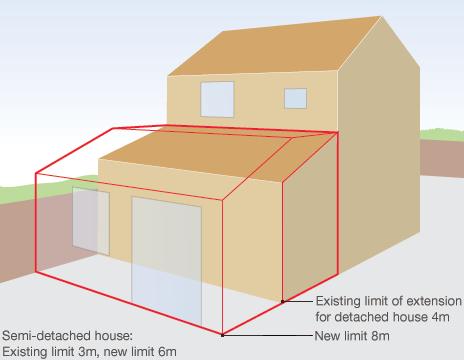Eric Pickles promises a 'revised approach' to home extension plan
- Published
Conservative MP Bob Blackman says the plans could lead to people having to take down extensions
Ministers will bring forward a "revised approach", after Tory and Lib Dem MPs objected to plans to double the maximum size of home extensions.
Communities Secretary Eric Pickles wants to ease planning restrictions in England for three years to boost the building trade.
But MPs argued that there would be little economic benefit to the plans.
Mr Pickles told MPs he was willing to find a "sensible compromise", as he sought to appease coalition rebels.
The new approach would be set out in the House of Lords when the Growth and Infrastructure Bill returns there next week, Mr Pickles said, after discussions with MPs.
However, he did not give any further details on what the compromise might look like.
'Eminently bridgeable'
Ministers announced last year that they wanted a three-year relaxation of the planning rules to allow single-storey extensions of up to eight metres for detached houses and six metres for other houses to be built without planning consent being required.
The proposal, which is still under consultation, has angered some local authorities and is opposed by Labour.
Mr Pickles said he had listened to the concerns expressed by peers and MPs and said he believed "even at this late hour we can actually establish a broad consensus on these practical reforms".
He added: "I can announce today that in the spirit of consensus, we will bring forward a revised approach on the contentious question of permitted development rights for home extensions when the bill returns to the Lords.
"I believe that this is eminently bridgeable and I would like the opportunity to make that bridge."
He said MPs would get the opportunity to vote on the new plans when the bill comes back to the Commons on 23 April.
The Growth and Infrastructure Bill was amended last month by the House of Lords to stipulate that individual councils should be given the right to opt out of the planning rules changes.
Many Tory and Lib Dem rebels wanted to keep this change in the bill, but the government wanted to reject the amendment and instead to reach a compromise with MPs.
The government won vote by 286 votes to 259, a majority of 27.
'Greater clarity'
But not all MPs were convinced by Mr Pickles promise of a new approach.
Former cabinet minister Cheryl Gillan said she would not believe Mr Pickles until she saw the new plans "in black and white".
Zac Goldsmith, MP for Richmond Park, a vocal critic of the plans, was among 16 Conservative MPs and 10 Liberal Democrats who voted against the government.
He said the government needed to "give greater clarity" about how it plans to reach a compromise.
Conservative rebel, Stewart Jackson said it was "very bad legislation" which "offends against the principle of localism", while fellow Tory rebel Anne Main said it was "potentially going to be extremely divisive in communities".
But another Conservative MP, Heather Wheeler, insisted that the government's plans would create jobs.
She said: "We are desperately short of family-sized houses. This is an opportunity to kick-start local economies."
For Labour, shadow communities and local government secretary Hilary Benn said: "He (Eric Pickles) tries to suggest this is about empowering people, but what he is trying to do is take away the rights of neighbours to object to developments that they think are going to affect their rights and their amenity."
He said the scheme, as it stands, was "centralist" and would not "give the boost to the economy that has been claimed".
"I don't think that the back gardens of England should be made the victims of the failure of the government's economic policy," he added.

- Published20 December 2012
- Published20 December 2012